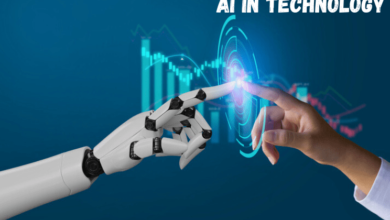Tech Advancements: Unravelling the Latest Industry Breakthroughs

Tech Advancements: In the ever-evolving landscape of technology, breakthroughs continue to redefine the possibilities of what can be achieved. From artificial intelligence (AI) to biotechnology, quantum computing to renewable energy, a myriad of sectors are experiencing unprecedented growth and innovation. These breakthroughs are not only transforming industries but also impacting the way we live, work, and interact with the world. As we delve into the latest advancements across various fields, it becomes clear that the future is unfolding before our eyes.
Artificial Intelligence and Machine Learning
Artificial Intelligence (AI) and Machine Learning (ML) have transcended their theoretical frameworks to become integral parts of our daily lives. The recent breakthroughs in this domain revolve around the development of more sophisticated AI models that possess the capability to understand and process data with unprecedented accuracy. With the rise of deep learning techniques, AI has become increasingly adept at complex tasks such as natural language processing, image recognition, and even decision-making processes.
One of the most promising tech advancements in AI is the development of Generative Adversarial Networks (GANs). GANs have revolutionized the field of computer vision and image generation, enabling the creation of lifelike images that are indistinguishable from real photographs. This breakthrough has significant implications for various industries, including entertainment, design, and even healthcare. GANs have the potential to revolutionize the way we create and interact with visual content.
Furthermore, the integration of AI in healthcare has led to remarkable tech advancements in disease diagnosis and treatment. AI-powered diagnostic tools are now capable of analyzing complex medical data and identifying patterns that might elude the human eye. This not only expedites the diagnostic process but also ensures more accurate and timely treatments, thereby significantly improving patient outcomes.
Biotechnology and Genetic Engineering
The realm of biotechnology and genetic engineering has witnessed groundbreaking achievements that are reshaping the boundaries of what is possible in healthcare, agriculture, and environmental conservation. CRISPR-Cas9, a revolutionary gene-editing technology, has unlocked the potential to edit genetic material with unprecedented precision. This breakthrough has not only accelerated research in genetic diseases but also holds the promise of eradicating various hereditary disorders from the human genome.
In the field of agriculture, biotechnological advancements have led to the development of genetically modified crops that are more resilient to pests, diseases, and adverse environmental conditions. These crops not only ensure higher yields but also minimise the need for harmful pesticides and fertilisers, contributing to a more sustainable and eco-friendly approach to farming.
Moreover, the emergence of synthetic biology has paved the way for the creation of novel materials and biofuels through the manipulation of biological systems. This interdisciplinary approach has the potential to revolutionise multiple industries, including energy, materials science, and pharmaceuticals, by offering sustainable and cost-effective alternatives to traditional manufacturing processes.
Quantum Computing and Cryptography
The Quantum computing, often heralded as the next frontier in computational power, has made significant strides in recent years. Quantum computers leverage the principles of quantum mechanics to perform complex calculations at an unprecedented speed, surpassing the capabilities of classical computers by a considerable margin. This breakthrough has the potential to revolutionize various sectors, including cryptography, pharmaceutical research, and financial modelling.
In the realm of cryptography, quantum computing poses both a threat and an opportunity. While quantum computers have the potential to break traditional encryption methods, they also offer the possibility of developing quantum-resistant cryptographic algorithms. Researchers are actively exploring post-quantum cryptography to ensure the security of sensitive data and communications in the face of evolving technological threats.
Furthermore, the application of quantum computing in pharmaceutical research has accelerated the discovery of new drugs and materials by simulating complex molecular interactions and conducting precise quantum simulations. This has the potential to significantly reduce the time and resources required for drug development, thereby expediting the process of bringing life-saving medications to the market.
Renewable Energy and Sustainability
The imperative to combat climate change has fueled remarkable tech advancements in renewable energy technologies, driving the global transition toward a more sustainable and eco-friendly future. Solar energy, in particular, has witnessed substantial growth, with the development of more efficient photovoltaic cells and innovative solar harvesting technologies. These tech advancements have not only made solar energy more cost-effective but also expanded its accessibility, thereby contributing to the reduction of greenhouse gas emissions and dependence on fossil fuels.
Moreover, the integration of energy storage solutions, such as advanced battery technologies and grid-scale energy storage systems, has bolstered the reliability and scalability of renewable energy sources. These storage solutions ensure a consistent power supply, mitigating the intermittency issues associated with renewable energy generation and facilitating a smoother transition toward a decentralised and resilient energy infrastructure.
Additionally, the emergence of sustainable materials and green manufacturing processes has revolutionised the production of consumer goods and industrial products. Researchers and engineers are actively exploring biodegradable materials, eco-friendly manufacturing techniques, and circular economy models to minimise the environmental impact of various industries, including fashion, construction, and electronics.
Ethical Considerations and Future Implications
Despite the remarkable advancements in technology, ethical considerations remain paramount in ensuring the responsible and equitable integration of these breakthroughs into our society. As we embrace the potential of AI, biotechnology, quantum computing, and renewable energy, it is imperative to address concerns related to data privacy, genetic manipulation, cybersecurity, and environmental sustainability. Establishing robust regulatory frameworks, fostering transparent governance, and promoting ethical practices are essential to harnessing the transformative power of these technologies for the collective benefit of humanity.
Looking ahead, the continued collaboration between researchers, innovators, policymakers, and stakeholders from diverse fields will be instrumental in shaping a future where technology serves as a catalyst for positive societal transformation. By prioritising ethical standards, sustainability, and inclusivity, we can ensure that the latest industry breakthroughs contribute to a more equitable and prosperous world for generations to come.
Conclusion
The recent strides in artificial intelligence, biotechnology, quantum computing, and renewable energy signify humanity’s profound potential for technological innovation. However, these breakthroughs must be accompanied by a steadfast commitment to ethical frameworks, sustainability, and inclusivity. By addressing the associated challenges of data privacy, genetic manipulation, cybersecurity, and environmental impact, we can ensure that these advancements serve the collective well-being of society. The collaborative efforts of researchers, policymakers, and stakeholders will be crucial in harnessing these advancements for a future that prioritises both technological advancement and the preservation of our planet, fostering a world where innovation is harmoniously balanced with societal and environmental stewardship.
FAQs
What is AI?
AI is the replication of human intelligence in machines, allowing them to carry out operations like learning, problem-solving, and decision-making, which traditionally need human cognition.
How does CRISPR work?
CRISPR is a powerful gene-editing tool that allows scientists to precisely alter DNA sequences. It works by guiding an enzyme to a specific location in the genome to make changes.
Why is quantum computing important?
Quantum computing has the potential to solve complex problems at a speed that surpasses classical computers. It could revolutionize fields like cryptography, drug discovery, and material science.
What are the benefits of renewable energy?
Renewable energy sources, such as solar and wind power, offer cleaner energy production, reduced greenhouse gas emissions, and increased energy independence, contributing to a sustainable future.
How does GAN technology work?
Two neural networks that compete with one another make up generative adversarial networks (GANs). One network generates new data, while the other evaluates the authenticity of the generated data.




